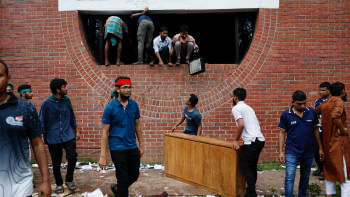The movement of tomorrow

Following Sheikh Hasina's abrupt resignation yesterday, we saw waves of people joining the victory marches in the streets. And they had good reasons for it. It was an outburst of frustration that had been boiling inside the people of Bangladesh for 15 years. We saw our democracy blundered by rigged and unfair elections. We saw the organised persecution of the leaders and activists of the then-opposition party BNP using our state's resources. Anyone the Awami League deemed as a threat has been harassed, sued, made victims of enforced disappearance, or killed—that includes my father, who was abducted by state forces in 2020. The voice of the people had been taken away through the Digital Security Act, now rebranded as the Cyber Security Act. We had to think ten times before criticising or calling out any government policy. The Awami League, under Hasina's leadership, had absolute power. And the abuse of this power by them was also absolute.
The celebration of bringing down an autocratic leader soon turned sour. What followed was the image of a country in chaos with no head of government, while all law enforcement agencies pulled away from the streets. The images of people storming the Gono Bhaban caused some giggles. But the smiles stopped when we saw people storming the Parliament, damaging property, and setting the Bangabandhu Memorial Museum in Dhanmondi Road 32 on fire. The night turned more horrific with attacks on a multitude of government establishments, and private businesses. Police stations were attacked and weapons were stolen. But above all, the most horrific reports were of minorities coming under attack. Businesses owned by Hindus, temples, churches, and even private properties of minorities were attacked, looted, and set ablaze. It was hard to sustain the feeling of victory while citizens of our own country were worried for their lives.
Yet, I see hope.
Some positive news started coming in late at night. People immediately protested the attack on minorities online, and volunteer groups were formed, ready to mobilise to try and defend people coming under attack or help in any manner. The student movement coordinators immediately condemned the damage to public property and violence against minorities. They also encouraged the youth to play an active role in protecting public property and minorities, saying that the uprising was not against a fascist but rather against fascism in general.
The response of the youth against the vandalism and violence shows that this is the movement of tomorrow. We have read about various national movements that shaped Bangladesh into what it is today. Our history has been marked by bloodshed but has also exemplified great strength. Time and again, the people of Bengal have displayed courage, standing up for their beliefs and driving systematic change.
This was a remarkably youthful movement, initiated and led by students, although it garnered support across all demographics. There is no doubt that the uprising of 2024 is led by the youth, mostly Gen Z. The protests exhibited some unique characteristics previously unseen.
The power dynamics we once read about in books unfolded before our eyes, shaping future narratives. Besides, a significant aspect distinguishing this movement from others is its heavy reliance on online communication for coordination and outreach. Although the flow of the movement was disrupted multiple times by government-imposed internet blackouts, the movement did not lose momentum. Everyone came out on the streets as soon as information became available about when or where to gather. However, in the future, this problem needs to be solved. Can the government be allowed to disrupt mobile internet connections in areas and even shut down the entire nation's internet connection at will? During the internet blackout, there was no formal way to access news. The only 24-hour news medium was television channels, which disappointed us greatly as they were not even reporting the death tolls. How can we ensure that such deterioration of journalistic practice and ethics does not repeat in the future?
The coming days will provide the answers as the political scenario changes. Our parliament has now been formally dissolved, creating a huge power vacuum in the country. Dr Yunus has agreed to accept the role of Chief Advisor for the interim government as proposed by the student coordinators. Khaleda Zia too has been released, and Bangladesh Nationalist Party General Secretary Mirza Fakhrul has said they will bring back Tarique Rahman soon. Jamaat-e-Islami will also, without a doubt, will run in the next election. Their participation in the Bangabhaban meeting on August 5, clearly indicates that the ban on them by the previous AL government will not hold. Meanwhile, the Awami League, though currently without leadership, has not totally disappeared. Their numbers and presence are still prominent.
The problem is none of these political parties seem like the ideal group to lead the change Bangladesh needs. Right now, we have a true opportunity for nation-building. None of these political parties in the past have been able to give us signs that they can be trusted. In the last couple of days, we saw many people asking the army to save them. But it was not the army that brought down the autocracy. It was the people. It was all of us together. None of the law enforcement agencies saved the students and other peaceful protesters, who were shot, beaten, burnt to death, or drowned all over Bangladesh.
Now it is the same people, the students who are guarding minorities, pledging to protect public property, handing over stolen arms from police stations back to the authorities and trying to keep traffic in control while the traffic police remain missing. We saw madrasa students protecting Hindu temples. If anyone should be chosen to lead the future, it is this conscious youth. We should not dismiss the attack on any group, religion, political party, or minorities simply because we don't belong to that group. We allowed the excessive persecution of the BNP by the Awami League because we are not BNP. We only came to the streets when it was us, who were under attack. Now we should protest against any corruption, irregularities, and indiscriminate violence against anyone and everyone. The movement should not stop with the removal of Hasina. The movement should continue for a permanently better democratic system that is participatory and can be held accountable.
Monorom Polok is a member of the editorial team at The Daily Star.
Views expressed in this article are the author's own.
Follow The Daily Star Opinion on Facebook for the latest opinions, commentaries and analyses by experts and professionals. To contribute your article or letter to The Daily Star Opinion, see our guidelines for submission.

 For all latest news, follow The Daily Star's Google News channel.
For all latest news, follow The Daily Star's Google News channel. 








Comments